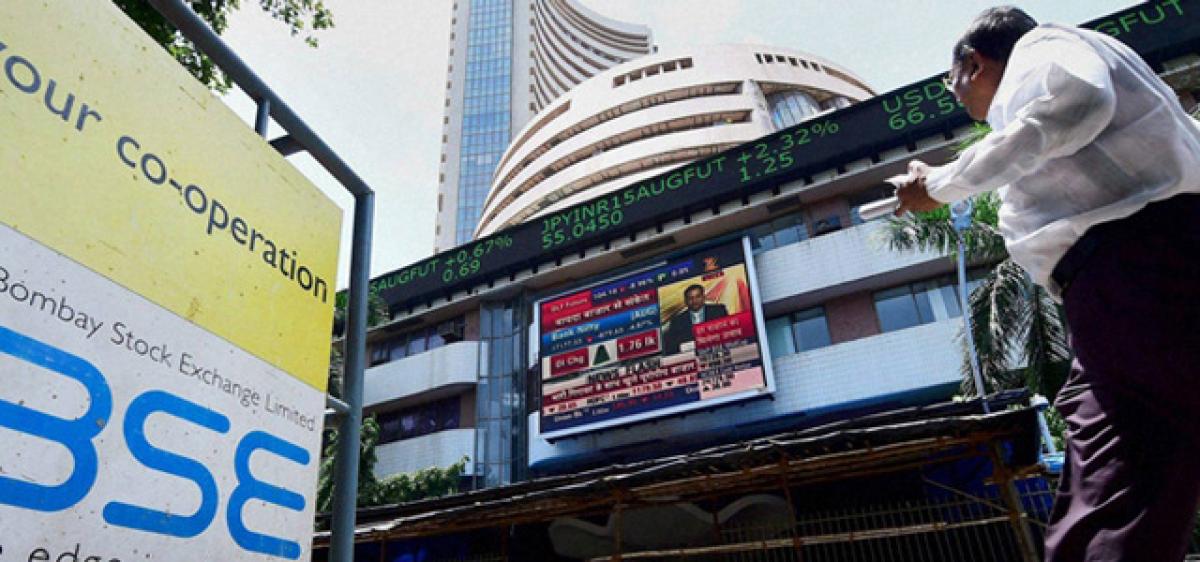Live
- G20 Leaders Will Talk About Climate, Taxes, and Trump's Return in Brazil
- COP29: CDRI announces $8 million funding for 12 projects to address climate crisis
- Anti-Telgu remarks: Actor Kasthuri Shankar moves court for bail
- Samsung AR Smart Glasses Set to Launch in 2025, Featuring Ray-Ban Meta-Like Design
- Kerala Industries Minister confident that new policy will boost plantation sector
- Madras HC plans inter-departmental monitoring committee to combat drug use in TN
- Bihar: Spotted deer dies due to heart attack in Banka district
- Mushtaq Ali T20: Shami to spearhead Bengal bowling attack, Gharami named captain
- Kharge's clarion call to oust Maharashtra's BJP-backed MahaYuti
- Why Ukraine’s Use of US Missiles Against Russia Could Lead to World War 3
Just In

About a dozen companies from latest list of trading ban by Sebi are based in Telangana and Andhra Pradesh. The market regulator Sebi has banned 331 listed companies and directed the stock exchanges to initiate action against these firms that it suspects are shell companies. Sebi directed BSE and NSE to conduct an audit of these listed companies.
Hyderabad: About a dozen companies from latest list of trading ban by Sebi are based in Telangana and Andhra Pradesh. The market regulator Sebi has banned 331 listed companies and directed the stock exchanges to initiate action against these firms that it suspects are shell companies. Sebi directed BSE and NSE to conduct an audit of these listed companies.
Cos barred from trading
AP
- Yantra Natural Resources Ltd
- Ergon Power Corp Ltd
TS
- Trinethra Infra Ventures Ltd,
- LN Industries India Ltd
- Venmax Drugs and
- Pharmaceuticals Ltd
- Farmax India Ltd
- GR Cables Ltd
- Secunderabad Healthcare Ltd
- Frontier Informatics Ltd
- Cybermate Infotek Ltd
On an average about 80 companies from Hyderabad are actively traded on the bourses. The situation is not different for companies from other states. The number of actively traded scrips among the total listed companies on BSE and NSE is less than half. It may be recalled that Hyderabad Stock Exchange (HSE) had 608 listed companies in addition to 202 non-regional companies on its platform.
It’s a biggest challenge for bourses and Sebi, observes K Naresh Kumar, financial analyst at Wealocity Wealth Management. “Shrinking liquidity is not only confined to companies in TS and AP, but also it’s a national phenomenon. Any transaction would be completed in any of these stocks after regulatory scrutiny and approvals.
It’s regulatory mechanism to monitor whether promoters stake is diluting. Sebi should increase barriers on price movements. Upward price movement shouldn’t be over the previous traded price. Promoters’ stake selling should be under stringent norms. Another major reason for illiquid scrips is that limited floating volume. If one buys 10,000 shares, then there wouldn’t be further availability of shares in that scrip,” Kumar told The Hans India.
When floating stock is less, naturally liquidity would also be low. In such scenario, if any sudden upward or downward movement price is noticed, bourses should monitor such bulk deals and take remedial measures. Otherwise, it leads to undue advantage of capital gains, he added. After the Enforcement Directorate (ED) cracked down on erring companies particularly those without any business activity, sudden ban of trading in scrips will dampen investors’ interests, feels Kumar, while adding “however, we have global majors from Hyderabad.
Stocks such as Dr Reddy’s, Divi’s Labs are from Hyderabad. About 80 companies are actively traded on the bourses.” According to the latest data, ED has identified that over 3 lakh registered companies indulged in suspected dealings. The Central Government has cancelled registration of over 1 lakh companies in a single stroke and more than 37,000 shell firms have been identified for strong action.
Subsequently, the Registrar of Companies (RoC), TS and AP circles, has already served notices to over 40,000 companies in both the Telugu states and directed them to file their annual returns within a month or face closure notice. The newly amended Companies Act 2013 further enables RoC to shut down shell or erring companies. It's estimated that there are 1.10 lakh companies registered with the RoC in TS and AP. RoC is monitoring 40,000 companies in both the states.
According to RoC, about 15 lakh registered companies in the country and only six lakh of these file their annual returns. Set up in 1875, Bombay Stock exchange (BSE) is the oldest stock exchange in the country and has over 5,000 companies listed on it. BSE has a record of being the only bourse in the world with highest number of listed companies.
Out of the 5,000 listed share on the BSE, only around 2,000 are actively traded. Most companies are hardly traded and some have been wound down and become sick units. Established in 1992, the National Stock Exchange (NSE) has about 2,000 companies.
By Sreenivasa Rao Dasari

© 2024 Hyderabad Media House Limited/The Hans India. All rights reserved. Powered by hocalwire.com







